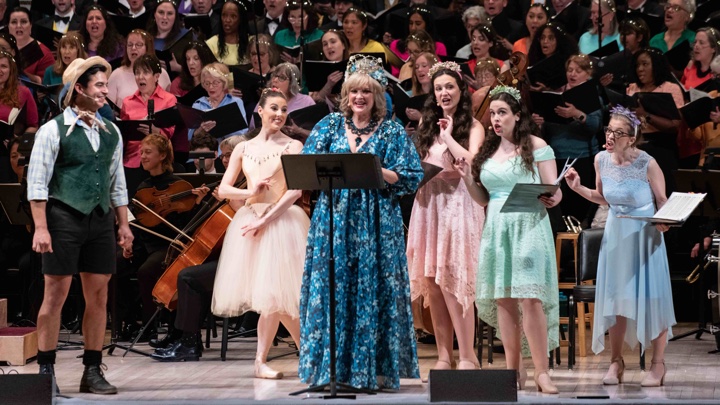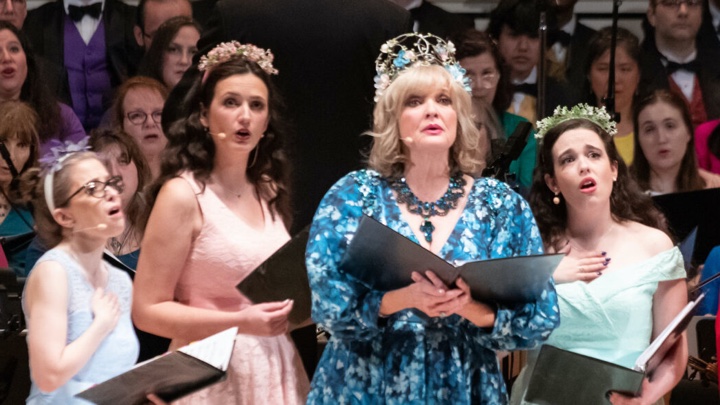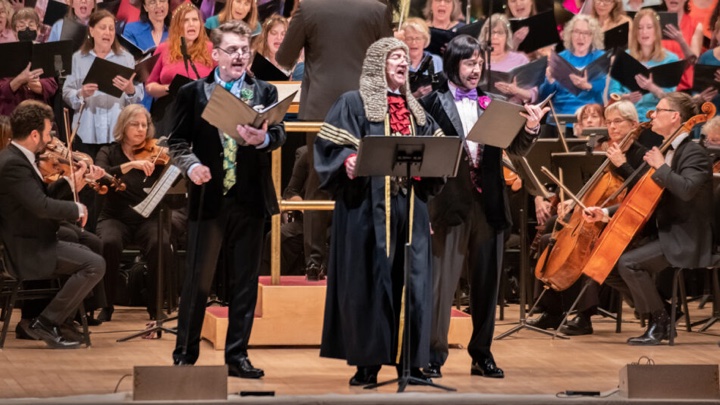
Strephon, a demi-fairy who, in one of Gilbert’s masterstrokes, is a fairy only from the waist up (his lower half is human), has fallen in love with Phyllis, a shepherdess who is also a ward of the Lord Chancellor of the House of Peers, whom, we learn early on is in fact Strephon’s father. Strephon and the fairies have to invade parliament itself to secure the lovers permission to marry, as all the while Iolanthe tries not to reveal her identity to the now persnickety and considerably older Lord Chancellor, who believes she died 25 years ago.
What results is a combination of marriage-plot staples— mistaken identities and misunderstandings, a pair of buffoonish rival lords who also want to marry Phyllis, and a central problem that’s easily resolved with a stroke of a lawyer’s pen. Everything is revealed, everyone falls in love, and all ends happily.
What makes Iolanthe feel distinctive is its consideration of government—lampooning the peerage, insisting on the inherent silliness of the Chancellor, who, having more power than he knows what to do with, ends up suing himself, hearing his own case, and ultimately deciding in his own favor. The lords are no better, and in the closest thing to biting satire, the wry “When Britain really rule the waves,” they admit their own history of ineffectuality, which traces back the Elizabethan times.
It seems to say that birthright peerage is no more of fair system than governance via magic: whether you inherit your title or you whip votes via fairy mind-control, it’s all about the same. But Iolanthe is more purr than either bark or bite: it’s a light comedy first and critique third, with a heavy dose of queer subtext (or perhaps it’s just queer text) in the middle.
Under artistic director (also conductor and, it seems, stage director) Ted Sperling, MasterVoices has often focused in the last decade on reviving somewhat under-sung works from otherwise canonical artists. This method can produce mixed result. At its worst, audiences are reminded exactly why some shows have stayed in the vault—they can’t all be hits, even from artists as distinguished as Stephen Sondheim, whose rather dreadful Anyone Can Whistle was revived last year (even Vanessa Williams and Santino Fontana couldn’t save that one).
At its, best, however, as it was with Iolanthe, it can remind audiences of the performance potential of a piece, issuing an invitation for revivals by other companies by displaying just how good a piece can be when put on by a stellar cast.
They work semi-staged with light costuming (the actors have books in hand for the lines and sometimes the music) and, as their name also suggests, they bring in big stars, often ones who are a tad over-powered and occasionally a tad under-rehearsed for their roles. While the former was certainly true this week, the latter was less-so; instead, the entire performance was characterized by an expansive ease.
Sperling and associate director/choreography Andrew Palermo’s direction was smooth and confident: it may not have invented any wheels, but it was consistently funny and perfectly pitched for the space. Little flourishes went a long way: a ballet-dancing fairy plucking the baton from Sperling’s hand to serve as a wand, the persistent faux-fluting that spoofed the pastoral, and the rather inspired inclusion of wry asides in the supertitles, all elicited chuckles and sometimes outright guffaws from the audience.
The big stars— David Garrison, Christine Ebersole, Santino Fontana, Jason Danieley and the inimitable Phillip Boykin—wore their roles lightly. These are all leading players who, in smaller roles than they’ve probably played in years, leaned back and let their natural presence and Gilbert and Sullivan’s tireless comic stylings carry them through. Garrison as the Lord Chancellor had the biggest lift with the patter-song showstopper, Act II’s “Nightmare Song.” He was especially deft: the effortlessness of his performance almost threatened to elide how impressive it was, that is, until you tried to mouth the words along with him.
Ebersole was a surprisingly earthy fairy Queen, her brassy contralto lending a slight edge to her character, only to soften utterly when confronted with Phillip Boykin’s Private Willis. Boykin, possessed of an astoundingly rich bass-baritone and a speaking voice that could melt stone, dropped into the second act like a sort of charisma bomb. He had only one song and a few lines of dialogue, but managed to steal more than just the Fairy Queen’s heart.
As bumbling peers and frenemies/romantic rivals Lord Mountararat and Lord Tolloller, Fontana and Danieley were each enchanting physical comedians, even in small roles. Danieley sang with a brilliant tenor and moved with perfectly-upright pomposity, wielding his silver-tipped cane (he hid behind it in a particularly funny moment).
Fontana, whom I suspect has a slowly withering painting of himself somewhere so terrifyingly charming is he, was almost too slick-voiced and warm-hearted in a sublimely hideous pageboy wig, whose lank strands and straight-across bangs he used to full comic effect. Their duet, where they fight over Phyllis’s hand (she couldn’t care less, of course, and leaves it to them to decide) was another high point. After a rather half-hearted attempt at heterosexuality, the two noblemen decide call the whole thing off: their friendship is more important.
None of the leads, save Strephon, whose desire for heterosexual coupling seemed more like the folly of youth (don’t worry, Streph, you’ll grow out of it,) seemed all that interested in straight marriage as anything more than the inevitable fulfillment of operatic convention. Even Phyllis has no particular illusions that her marriage to Strephon will make her happy forever. This made the evening even funnier: we all know that Gilbert and Sullivan’s operettas are bread and butter for the queers, and I’m only glad to be alive and out at a time where I can enjoy this fact openly.
One while more or less expect the big names to be good, but the night ultimately belonged to the relative newcomers. Soprano Ashley Fabian and baritone Schyler Vargas approached their roles with the palpable excitement of singers who are rounding the bend on their big breaks. Fabian combined a voice of immense warmth and scintillating spin with subtle comedic timing, as feisty shepherdess Phyllis, while Vargas displayed a radiant, sunny baritone, a highly developed sense of line, and irrepressible exuberance and sincerity as Strephon. These two are clearly stars in the making.
As Iolanthe herself, whose role is much smaller than the title suggests, Shereen Ahmed was sympathetic and subtle, with hint of musical theater belt to her bright sound, as a mother willing to sacrifice everything for her son’s love. A trio of fairy maidens, very prettily sung by Nicole Even Goldstein and Kaitlyn LeBaron with Emy Zener in a comedic speaking role, rounded out the main cast beautifully.
The final impression was that Iolanthe is there for the taking, waiting for a solid comic director and fully staged production to take it to magical heights. As it was, however, MasterVoices made—and won—their case.
Photo: Toby Tenenbaum





